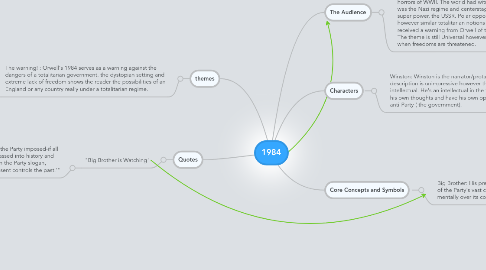
1. themes
1.1. The warning! : Orwell's 1984 serves as a warning against the dangers of a totalitarian government. the dystopian setting and extreme lack of freedom shows the reader the possibilities of an England or any country really under a totalitarian regime.
1.1.1. Other themes: It's my own personal belief that any other theme that could be extracted from the text is directly related or supplements the core theme stated above.
2. Quotes
2.1. "Big Brother is Watching"
2.1.1. "And if all others accepted the lie which the Party imposed-if all records told the same tale-then the lie passed into history and became truth. 'Who controls the past' ran the Party slogan, 'controls the future: who controls the present controls the past.'"
2.1.1.1. "If there was hope, it must lie in the proles, because only there, in those swarming disregarded masses, eighty-five percent of the population of Oceania, could the force to destroy the Party ever be generated."
2.1.1.1.1. "It was curious to think that the sky was the same for everybody, in Eurasia or Eastasia as well as here. And the people under the sky were also very much the same--everywhere, all over the world, hundreds or thousands of millions of people just like this, people ignorant of one another's existence, held apart by walls of hatred and lies, and yet almost exactly the same--people who had never learned to think but were storing up in their hearts and bellies and muscles the power that would one day overturn the world."
3. The Audience
3.1. The Audience of 1984 is of the utmost importance when understanding the stories theme. At the time Orwell was writing to a relatively frightened audience who was still getting over the horrors of WWII. The world had witnessed the horror show which was the Nazi regime and centerstage was now the new growing super power, the USSR. Polar opposite politically than the Nazi's however similar totalitarian notions persisted. Readers at the time received a warning from Orwell of the dangers of such a regime. The theme is still Universal however, being relevant in any time when freedoms are threatened.
3.1.1. New node
3.1.2. New node
4. Characters
4.1. Winston: Winston is the narrator/protagonist of the novel. Physically his description is unimpressive however this only visually adds to his perception as intellectual. He's an intellectual in the fact that he is one of the brave few to think his own thoughts and have his own opinion which of course all happen to be anti-Party ( the government).
4.1.1. Julia: Julia enters the novel as Winston's rebellious lover, who shares similar anti-party views, mainly for personal reasons and shys away from the grander, broader ideals held by Winston.
4.1.1.1. Big Brother: Although not necessarily a character per say, still an undeniable presence in the novel none the less. The claimed and nearly universally believed leader of Oceania, his ubiquitous image throughout anyone's life creates an omnipresent sense of Big Brother in that person. This in of it self is a symbol of the Party's unyielding reach of authority and control.
5. Core Concepts and Symbols
5.1. Big Brother: His presence and image is a symbol of the Party's vast control over both physically and mentally over its constituents.
5.1.1. Thought Police: The sword of the Party, the Party's will incarnate, the ever looming threat of the Thought Police busting down your door and taking you in for your heinous thought crime keeps inhabitants of Oceania chained to the will of the Party. They symbolically serve similar purposes and functions as Big Brother. P.S I find it hard not to see the blatant parallels between the Thought Police and Gestapo. Inspiration, I think yes.
